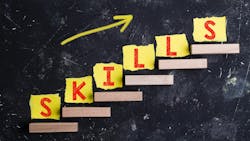As a recent dental hygiene graduate, I understand how overwhelming it can be to start your career. Having the correct set of skills will enable you to succeed clinically, establish trusting connections with patients, and make a significant contribution to your dental team.
Clinical knowledge is important, but there are a few other critical skills that might determine whether you survive or thrive in your early career. Here are eight useful skills that I believe are critical for aspiring hygienists.
Time management without compromising care
Effective time management can be one of the most difficult things to do when moving from school clinic hours to professional practice hours. In contrast to school, where you might be given three hours for each patient, appointments in the real world typically last 45 to 60 minutes. The secret is to figure out how to operate effectively without sacrificing quality of care. Arriving early to check charts and prepare for the day is very helpful, as is having a regular routine and setup for every patient.
Effective communication with patients
Technical expertise means little if you cannot communicate effectively with your patients. Communicating clearly and empathetically with patients is an essential component for success as a dental hygienist. Every patient has a unique background, level of knowledge about oral health, or perhaps dental fear or anxiety. It’s your role to provide care and educate them in an understandable and caring way.
I've learned that explaining procedures in simple, relatable terms and actively listening to patients’ concerns quickly builds rapport. Effective communication has the power to directly impact treatment outcomes, because patients who trust their hygienists are more likely to comply.
Patient education and motivation
Education is at the heart of dental hygiene. I believe that one of the most rewarding aspects of this profession is the ability to influence patients’ oral health habits, which can improve their overall health. To do this effectively, you need to go beyond simply lecturing patients to brush and floss.
Look for methods to inspire patients by tailoring your advice. Adapt your advice to suit particular needs, such as describing the connection between systemic health issues and periodontal disease, or suggesting an electric toothbrush for someone with poor dexterity. Your education efforts will have a greater impact if you’re aware of the obstacles and motives of each patient.
Teamwork and collaboration
To provide the best patient care, dental hygienists must collaborate closely with dentists, dental assistants, office managers, and other team members. Building a healthy work atmosphere requires great teamwork.
You can build strong bonds with your coworkers by proactively helping others when necessary, communicating clearly, and remaining adaptable. A cohesive team fosters an atmosphere that enables patients to get superior care. Keep in mind that you’re a member of a broader team that’s pursuing the same objective.
Confidence in clinical decision-making
Do you have imposter syndrome? As a new hygienist, it’s normal to second guess yourself. However, becoming a successful hygienist requires building confidence in your clinical judgment. Trust the knowledge and skills you acquired during your education while also being open to feedback and mentorship from experienced colleagues.
If you encounter a situation you’re not sure of, don’t hesitate to ask questions and seek guidance. Over time, your capacity to make confident decisions about patient care will grow.
Physical stamina and ergonomic awareness
This was covered in school but takes on a whole new meaning in practice. Ergonomics are key for career longevity. Proper positioning and body mechanics prevent fatigue and musculoskeletal disorders. I've made it a priority to maintain good posture, take micro breaks when possible, and incorporate stretching into my daily routine. Investing in good loupes and proper positioning early in my career has been worth every penny.
Documentation excellence
Thorough, accurate documentation is not just a legal requirement, it's a critical clinical skill. Learning to write detailed, concise clinical notes while staying on schedule takes practice. You can develop a system of shorthand and templates that will help you maintain comprehensive records without falling behind. Remember, if it is not documented, it did not happen!
Continuous learning mindset
Dental hygiene is constantly evolving, with new research, techniques, and technologies emerging regularly. Staying current is not just about meeting CE requirements; it's about providing the best possible care for your patients. I make it a point to read dental journals, participate in online discussions, and attend study sessions whenever possible.
Becoming a skilled hygienist is a journey, not a destination. While these skills take time to develop, consciously working on them from the start of your career will set you up for long-term success. Don't be too hard on yourself as you develop your abilities. Every seasoned hygienist was once in your shoes, learning and growing day by day.
About the Author
Imani Wilson, RDH
Imani Wilson, RDH, is a licensed dental hygienist and a recent graduate of Valencia College. Dedicated to promoting oral health and providing exceptional patient care, Imani is passionate about her work in dental hygiene and continually seeks to expand her knowledge and skills in the field. For more information, visit imaniwilson.co, or follow Imani on Instagram at @toothymani.


